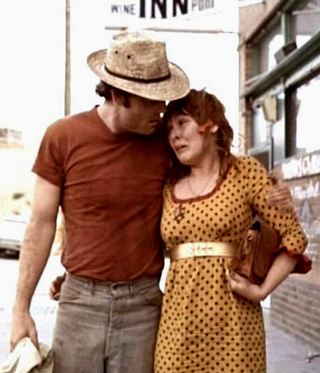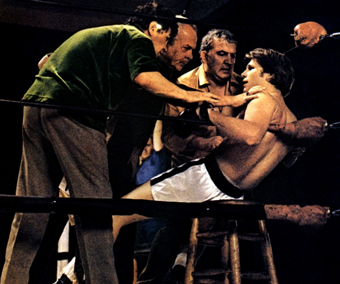
 |
|
|
|
During his lifetime, Hollywood director John Huston was often reviewed on the basis of his maverick personal lifestyle. Reports from the set of his triumph The African Queen paint a picture of a man less interested in filming a movie than running off on safari. If Huston agonized over his film work, he kept his feelings well hidden. In her book on the making of Huston's The Red Badge of Courage, Lillian Ross witnessed the destruction of a potential American classic in a studio power play. MGM so radically chopped down the film that it barely reaches feature length. But Huston was the kind never to look back, and had already moved on. 
Critics also cite the typical Huston theme as a celebration of glorious failure, the shining example being Treasure of the Sierra Madre. Its prospectors lose everything and then share a belly laugh at the cosmic joke played at their expense. Huston's heroes may fail but their efforts are admired, applauded: revolutionary conspirators (We Were Strangers), jewel thieves (The Asphalt Jungle), ecological guerillas (The Roots of Heaven). There are exceptions, but even some of those are deceptive. We're told that the attempt to sink the gunboat at the end of The African Queen was originally scripted to fail. John Huston made plenty of box office flops yet rarely a dull picture. While other great directors struggled to stay working in the new Hollywood of the 1970s, Huston adapted to new forms. His first artistic triumph of the Director's Decade is Fat City, a fascinating portrait of a core Huston loser, a washed-up prizefighter who gives the game another try. Critically applauded but passed over at the box office, Fat City can boast a terrific cast headed by Stacy Keach and Jeff Bridges, and featuring a startlingly original performance by Susan Tyrell. Writer Leonard Gardner adapted his own novel for the screen. Broken-down boxer Tully (Stacy Keach) supports his liquor habit by picking crops with the migrant workers near Stockton, California. Meeting Ernie (Jeff Bridges), an enthusiastic novice boxer with potential, Tully is inspired to try the ring again. Both fighters are represented by manager Ruben (Nicholas Colasanto), a lover of the sport who can't seem to choose a winner -- all of his hopefuls keep getting pummeled. Ernie decides to persevere despite the misgivings of his sweet girlfriend Faye (Candy Clark), even after his nose is flattened in his very first fight. Meanwhile, Tully begins a relationship with the slovenly Oma (Susan Tyrell), a garrulous, argumentative alcoholic with a voice that could peel paint. Oma takes him in while her regular man Earl (Curtis Cokes) is locked up in prison. Ruben manages to get Tully a fight with a contender from Panama named Lucero (Sixto Rodriguez). Can Tully withstand Oma's emotional onslaught, and stay sober long enough to fight? 
Huston adapts ably to the new character-oriented rhythms of '70s filmmaking. His opening sequence establishes the economic stagnation in Stockton as the unkempt and unwashed Tully ventures out of his dingy flat in search of a match to light his last cigarette. Tully is basically a good egg, a man with few grudges. He fell out of shape after being cut up by an opponent who may have hidden a razor in his boxing gloves. Booze took him the rest of the way to the bottom. Unlike the semi-docu On the Bowery or Barbet Schroeder's inebriate's epic Barfly, Fat City doesn't condemn, mock or pity the drunks at "the bottom". Tully finds a new colleague in Ernie, and both boxers have a loyal friend in their manager. Ruben is not a particularly able boxing manager, as he tends to transmit his own nervousness to his clients. A hilarious pre-fight scene sees the young fighters desperately trying to psych themselves up for victory. But no manager cares more about "his boys" than Ruben. Post-fight, with every one of his crew bruised or bandaged, Ruben hands out the beers and assures his troupe that everything will be fine the next time. Due to the punishment he's taken and his daily consumption of alcohol, Tully is just beginning to show signs of boxer's dementia. He continues to drink, whether training or picking crops in the intense heat of the fields. But the caustic Oma is even tougher on his overall morale. The woman either drowns Tully in affection or lashes out with complaints and abuse. She's a total mess but our heart goes out to her anyway. The emotional whiplash has the normally unflappable Tully throwing temper tantrums of his own. Come the big fight with the pro from Panama, Ruben must rush to dry Tully out. He enters the ring exhausted and disoriented. Gardner and Huston emphasize the loneliness and isolation of unsuccessful professionals. As it turns out the Panamanian boxer Lucero is in even worse condition than Tully. Something is wrong with his kidneys, as he urinates blood. The man walks slowly into the stadium, dignified but always alone; it's clear that he's just hoping to collect his money and go home. Lucero's nose was broken long ago, and lies flattened to one side. The film's big match is between two pathetic pros on the verge of collapse. 
Fat City was Jeff Bridges' follow-up film after his breakthrough in The Last Picture Show. He's intensely likeable and self-assured as a decent, if not-too-bright young athlete. Ernie barely listens to Faye's hints about marriage; he's only capable of concentrating on one topic at a time. Candy Clark's Faye is a precursor to her marvelous performance in the next year's American Graffiti. It's clear that Faye will keep Ernie and make him happy. The amazing Susan Tyrell can't be blamed if the right parts didn't come along -- there simply aren't any more like her around. An utterly unregenerate character like Oma couldn't be properly portrayed in American movies until the retirement of the old Production Code. Had Hollywood remade the classic loser noir Detour in the early 1970s, Susan Tyrell would have been the ideal candidate to fill the shoes of Ann Savage as the ferocious Vera. With the accomplished Conrad Hall as lighting cinematographer, Fat City's look is raw and naturalistic, yet never distractingly crude. Street and bar scenes are filmed from static setups but the camera moves fluidly during the fight action. Proving that a choice film assignment heals all relationships in Hollywood, Huston's supervising editor is Margaret Booth, formerly Louis B. Mayer's editorial hatchet woman. Booth spent a long career enforcing the requirement that all MGM pictures conform to dull house conventions of continuity cutting. According to Lillian Ross, she presided over the dismembering of Huston's The Red Badge of Courage twenty-one years before. Interestingly, Ms. Booth does quite well with the relaxed, sometimes purposely slack pace of Huston's character-driven mini-masterpiece. Sony Pictures Choice Collection's DVD-R of Fat City is a fine encoding of one of John Huston's least-known gems. Color and sound are quite good. The song Help Me Make it Through the Night, sung by Kris Kristofferson, is heard over the title sequence. The plain-wrap presentation plays the feature directly upon loading the disc and will recycle it until stopped. Sony released a now out-of-print standard DVD of this show ten years ago. The old disc's one advantage is that it has removable English subtitles. As with so many studio library releases today, "no frills" formatting gives hearing-impaired viewers less and less access to the old movies they love.
On a scale of Excellent, Good, Fair, and Poor,
Fat City rates:
Reviews on the Savant main site have additional credits information and are often updated and annotated with reader input and graphics. Also, don't forget the 2011 Savant Wish List. T'was Ever Thus.
Review Staff | About DVD Talk | Newsletter Subscribe | Join DVD Talk Forum |
| ||||||||||||||||||